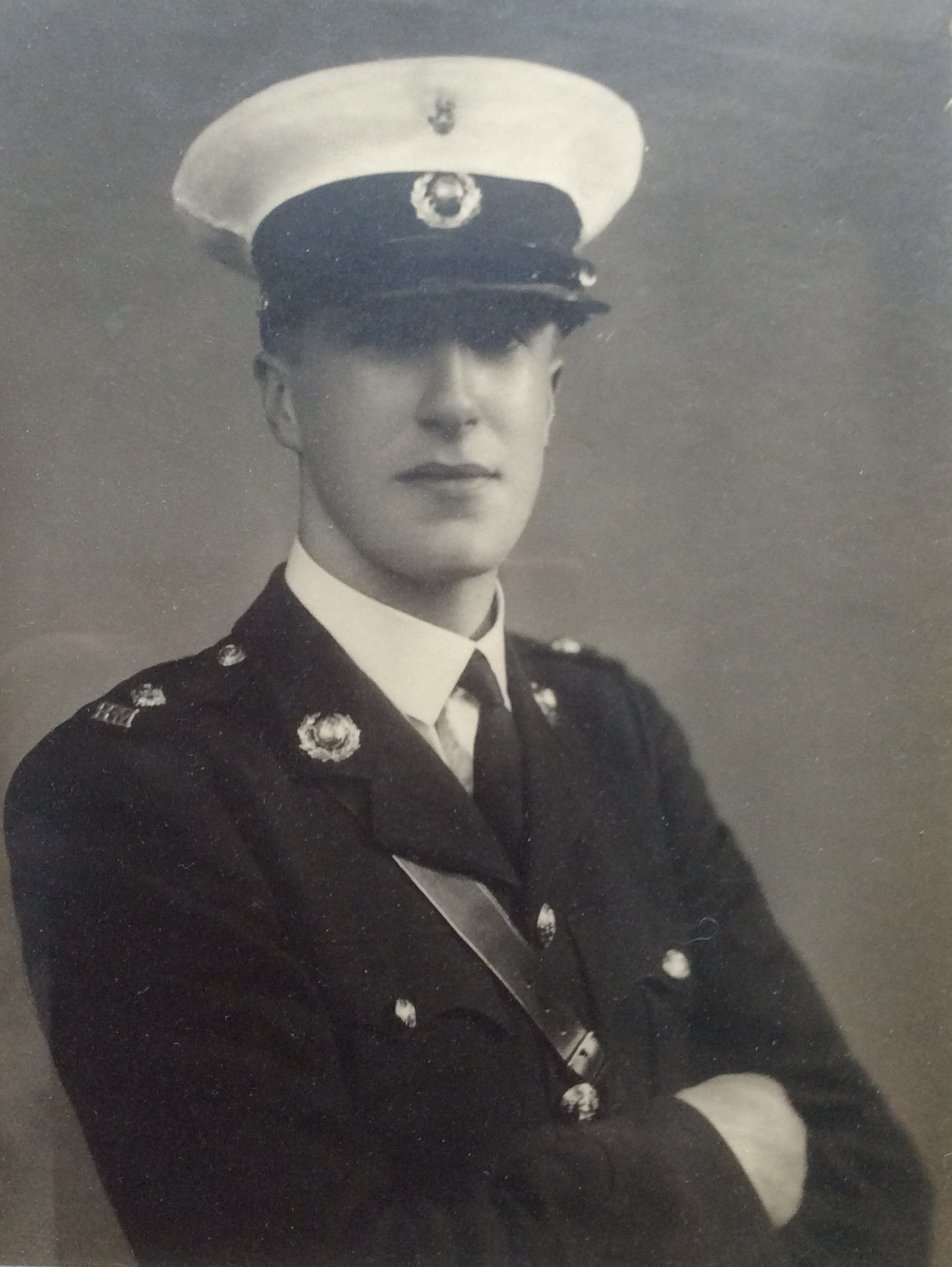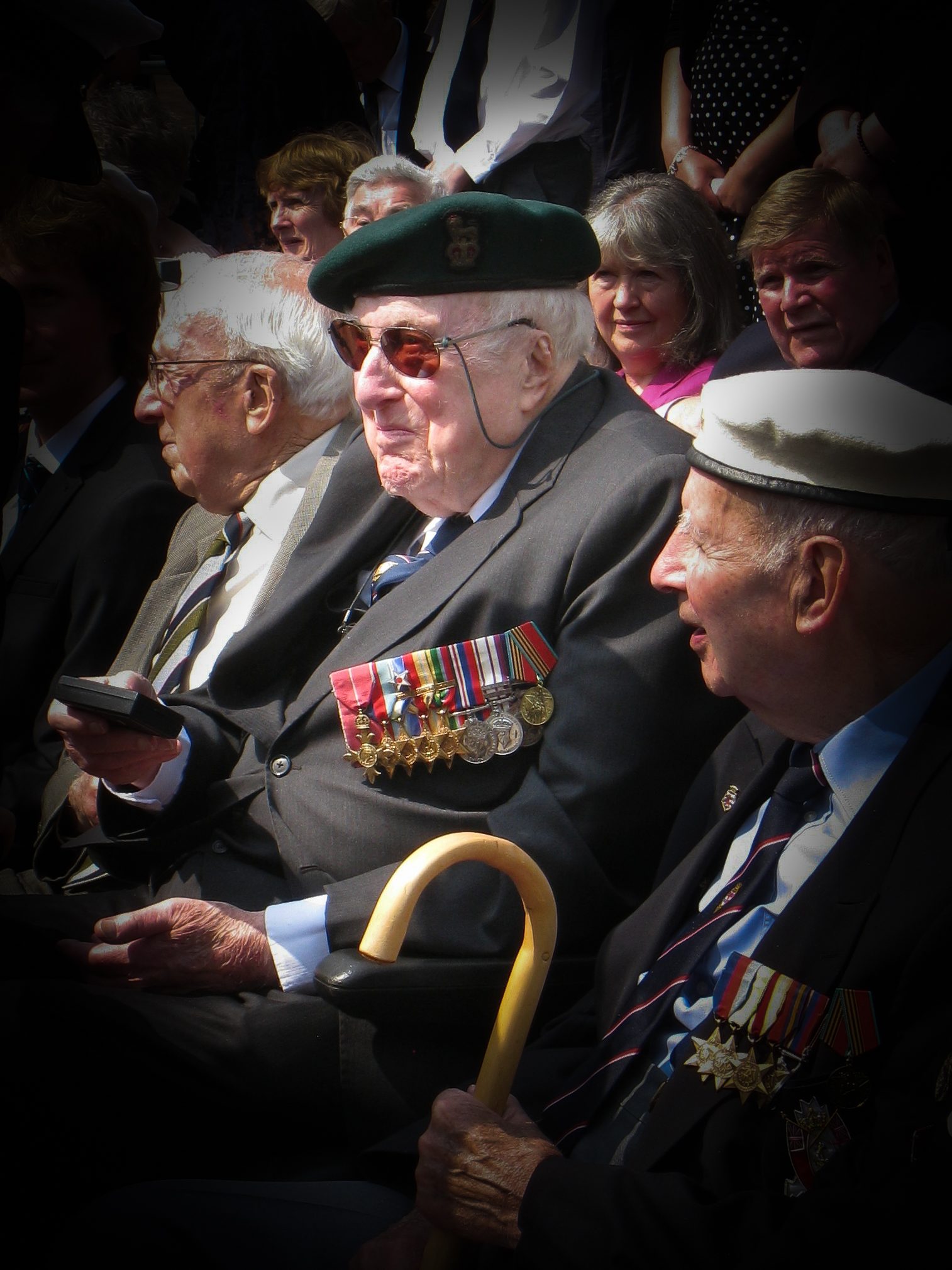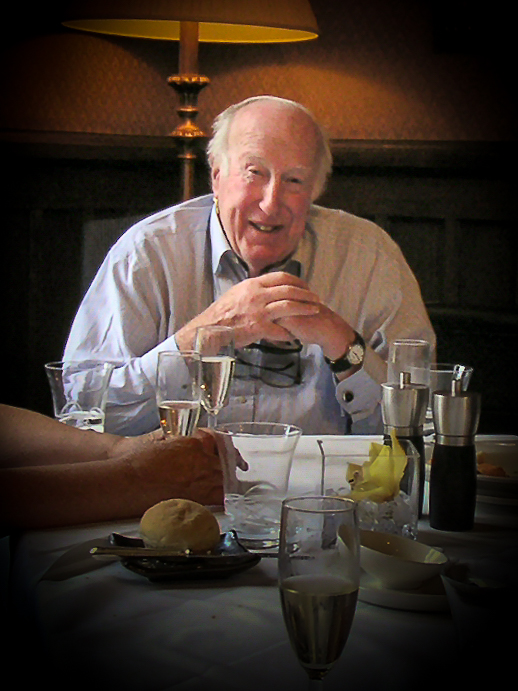
Written by the late Brig. Robin McGarel-Groves RN OBE:
As the cruiser Enterprise entered Belfast Lough on 2nd June 1944 and anchored off Bangor, we saw several old friends had also arrived. Enterprise was to be part of Bombarding Forces A and C, the ships that were to support the landings on Utah and Omaha beaches.
Glasgow was our chummy ship. With her, we had shared the honours in the Battle of the Bay of Biscay in late December 1943, where, between the two of us, we had sunk three of the eleven German destroyers opposing us and had emerged with only minor action and weather damage. We had already met the American ships Nevada, Texas and Tuscaloosa at Exercise Tiger, which comprised the various rehearsal exercises with the US Army at Slapton Sands in South Devon. Black Prince, Hawkins and Bellona, we had met during Exercise Fabius - similar rehearsals with British Assault Forces at Studland in Dorset. These two areas, cleared of all their normal inhabitants, had been chosen because of their similarity to the planned areas of assault in Normandy.
Before arriving in Bangor, Enterprise had changed all of her six-inch guns, which had been worn out by action and practice firings. The ship had, of course, been sealed, and no shore leave was permitted; disappointing for me as I had hoped to be able to visit my old family home at Magheramorne, County Antrim. The same had happened to me almost two years previously when serving on the cruiser Sheffield, which had also anchored off Bangor. On that occasion, warships and merchant ships were assembled for Operation Torch, the landing in North Africa, which could no longer be seen as a form of rehearsal for Operation Neptune, the naval part of Operation Overlord.
This time, as Captain of the Marines of HMS Enterprise, I had custody of the operation orders and found my time fully occupied in inserting all the last-minute amendments. Apart from a very few others, only I knew the date of D-Day. A few days earlier, the wardroom had organised a sweepstake on this date, and I, seemingly lucky, had drawn 5th June.
Early on 3rd June, Bombarding Forces A and C sailed, together with many of the vast number of landing ships that were to assault the two beach areas. When dawn broke, the horizon seemed to be full of ships, and as we rounded Lands End, we could see that the armada was enormous, but the weather began to deteriorate alarmingly. It was no great surprise that all ships were quickly ordered to reverse course, having been told that D-Day was postponed for 24 hours. So much for my sweepstake prospects, but I did have D-Day as a 24th birthday present.
Whilst we on Enterprise felt some of the effects of the bad weather, we could not help but feel sorry for the unfortunate soldiers and marines rolling around in the small craft. The order to reverse course caused its own problems, and there were a number of near collisions. We also heard that one convoy had not received the postponement signal, and only last-minute emergency measures prevented a disaster.
The next morning, once all ships had resumed their original course, they all had to pass through an area appropriately code-named Piccadilly Circus in order to enter their allotted swept Channel in the correct sequence within the 'spout' leading to the Assault beaches. Enterprise had been given the task of leading ship for Force U, the Utah Beach task force, under the command of American Vice Admiral Morton Deyo. Our role was to slowly follow the minesweeper sweeping us in and then to anchor in a pre-designated position, ready to open fire on the beaches before the landing of American troops.
As this position was some 6,000 yards from two German 13-inch coastal batteries, we fervently hoped that the RAF and USAF had done a thorough job in knocking them out. Nevertheless, many of us had landed most of our possessions and had increased the insurance on the remainder. We went to Action Stations soon after midnight, having been warned that we were likely to remain closed up for at least 48 hours. On medical advice, we were all advised to take benzedrine to keep us awake. My experience was that it certainly kept one awake, but as time went on, one became slower and slower in solving quite simple problems, and when one finally could get some sleep, one woke up with all the symptoms of a hangover without any of the prior compensation.
Sitting in the Director Control Tower above the bridge and from where the guns were controlled, I had a first-class view. The sea was still rather rough, and there was quite a lot of mist. Just ahead was the blue stern light of our minesweeper. We had to keep close up for fear of losing her, but the speed of advance was probably 5-6 knots, being the speed required for minesweeping. I think we had also streamed our own paravanes to cut any mooring mine that might have been missed.
As the first light of 6th June appeared in the sky, the dim outline of the French coast could be seen. Finally, we reached our allotted position and were anchored. The air forces had evidently done a good job, as no large shell splashes greeted us. I gave the order to load all guns, and the Navigating Officer, having fixed our position accurately, fired broadsides at the landing beach by blind fire. A couple of landing craft fitted with banks of rockets lay quite near us, and when these fired, one could feel the heat. I hate to think of the experience of the crew crushed in behind their blast screens. As each bank of rockets landed, the beach seemed to erupt. On our other side, an American destroyer [Russcolley] struck a mine, broke in two and sank very quickly. Fortunately, most of the crew were rescued. This was one of the first casualties caused by German Oyster mines, which were activated by the movement of a ship passing over them.

Soon after this, the order was given to restrict speed to dead slow in the operation area. After truly drenching the beach area with our fire, we found ourselves responding to calls for fire from US Typhoon aircraft. I can still remember our call sign, which was 'Queen Easy Dog', and one of our favourite air spotters was a Texan with the call sign 'Nan Tare Rodger' pronounced with a marvellous Southern drawl. These calls for fire came steadily throughout the day and night, and the following day. In fact, Enterprise expended so much ammunition that we soon had to nip back to Spithead to replenish. We arrived during the afternoon to be met by an ammunition craft, and all hands turned to, continuing well into the night until we had finished. We also took the opportunity to top up with oil fuel and fresh provisions. We sailed at first light and, while occasionally firing at doodlebugs or flying bombs overhead, moved to a position from where we could give support to the Americans on Omaha Beach, where all had not gone according to plan. Calls for fire now came from Forward Observation Officers (FOOs) as well as air spotters. Targets included tanks, troops' bodies, artillery, and transport. One target selected by one of our air spotters was a German motorcycle despatch rider who was chased along a road by 6-inch shells and who eventually abandoned his bike and 'took to the hills'.
Not long after this, we were recalled to the Utah Beach area, where inshore minesweepers were being shot at by German coast batteries while they attempted to clear a wider area of German mines. Our task was to neutralise and knock out one of these batteries, which consisted of six 5.9-inch guns set in concrete casements. To knock out each gun, it was necessary to pitch a shell either onto the muzzle of each gun or into the aperture in the casement. The technique we adopted was to fire single gun rounds until we found the target, then fire two or three six-gun broadsides, and then repeat the process. Our action certainly neutralised the target, and later inspection by the ground forces, who eventually overran the battery, reported it abandoned, with four of its six guns destroyed.
The weather since D-Day had continued to be poor, and a few days later, it really came on to blow, bringing all ship-to-shore movement to a halt. Enterprise put down a second anchor, and we found ourselves fending off various small craft as the storm blew them past us. Some of the more fortunate managed to get a line aboard, and we soon found ourselves with a long tail of small craft strung out astern. We managed to float bread and fresh provisions down to them until the storm abated. The Great Storm, as it became known, destroyed one of the two Mulberry Harbours, which was at Omaha Beach and had to be abandoned, and severely damaged the other, which was at Arromanches on Gold Beach and was later repaired, as well as leaving scores of wrecked landing craft piled up on the beaches.
Around the 23rd of June, we were ordered back to Portland to re-ammunition and re-fuel. There, we found many of our old friends - Glasgow, Quincy, Tuscaloosa, Nevada, Arkansas and Texas, as well as a number of American destroyers. This was the gathering of another force under Vice-Admiral Morton Deyo, who was now preparing to bombard Cherbourg from the sea in order to assist the American forces attacking from the land side. Our task force sailed from Portland very early on the 25th of June. On board, we had a well-known journalist and several official photographers to observe. Our allotted targets were the batteries on the breakwater in front of Cherbourg harbour. Enterprise took up station astern of Glasgow. No sooner had we opened fire than the German batteries replied vigorously, straddling us very early on. Glasgow was hit, and a fire started, but she continued in action. American destroyers started to lay smoke screens, but the Germans probably had radar, as did Enterprise. Our Canadian Captain Harold Grant twisted and turned the Enterprise at high speed, handling the ship like an oversized destroyer. Miraculously, we were not hit, but we received quite a lot of splinter damage. One of these splinters seriously wounded Captain Grant, and the ship had to be conned thereafter by the Navigating Officer who was with him on the bridge. Another shell splinter wounded the Commander, J W Hoskins, who was in the aftercontrol. The action continued, and it was very satisfying to see our shells falling on and around the breakwater. Eventually, the order was given to withdraw, and the ship was brought back to Portland by the First Lieutenant, Lieutenant Commander Brown.
After a hurried re-ammunition in case we were required to return to Cherbourg and a conference aboard the flagship to put together section reports, Enterprise was sent to Portsmouth to change yet another set of guns. In the first nine days after D-Day, she had fired over 4,000 shells. Having changed our guns in just over 48 hours, we moved to Spithead to await the arrival of our new Captain. His name was Alan George Cumberland Peachey, a very different character from the free and easy Canadian Grant. He had a medium build and wore very high, stiff collars and long, stiff cuffs to his shirt. He also had long sideburns and seemed to wear a permanent sardonic expression. His last command had been the battleship Royal Sovereign during her handover to the Russians as the Arkengleski. We reckoned he would have proved a good match for the Russians, and it was quite evident that he thought we needed a good shake-up. On the first Saturday of the Captain's rounds of the ship, he appeared wearing white gloves and carrying two spare pairs with his Captain's messenger. The Captain set off, followed by all the Heads of Departments, and over every horizontal ledge and edge, he ran his white-gloved hand, which unsurprisingly came off black. "Filthy," said the Captain. After finding various loose wires from our temporary electrical repairs, there was more trouble. Having got barely halfway around and 'filthied' all the pairs of white gloves, he said, "I am going no further and will do Captain's rounds next Saturday, by which time I expect to see a marked improvement in the cleanliness and efficiency of the ship, and in the meantime, I shall require reasons in writing from each Head of Department." He then proceeded to list to each of us our inadequacies as he saw them. Mine was that the keyboard sentry, whose post was outside the Captain's Cabin, was wearing hobnailed boots which kept the Captain awake at night. In my case, the reasons in writing appeared simple - 'other pair of boots were under repair and now repaired. No chance of this happening again.' I felt satisfied that this closed the matter, but my confidence was dented by a different keyboard sentry repeating this heinous offence only two days later. I had to eat humble pie in a second 'reasons in writing'. Obviously, Captain Peachey knew something that we did not, for soon after Enterprise sailed for Arromanches to act as accommodation ship for the visit of the Prime Minister Winston Churchill to Normandy. He was accompanied by General Ismay and Commander Thompson.
The Great Man eventually appeared on board about dusk after a swift visit to General Montgomery. Our first worry was that during air raids, of which there were quite a few, the Prime Minister insisted on coming up on deck to see what was going on, and refused the offer of a tin helmet. Whenever any German aircraft appeared over Arromanches, everyone let loose with every form of anti-aircraft weapon. As a result, the risks were more from falling anti-aircraft splinters and spent bullets than from German bombs. A 'Brocks benefit' was the best way to describe the mass of tracer bullets and bangs. After dinner in the wardroom we indulged in a sing-song ably led by one of our Australian officers, with his speciality 'On the Road to Mandalay'. Halfway through this, we were joined by Sir Winston, who requested we sing 'Rule Britannia'. Accompanied by the padre on the piano, we did full justice to the first and only verse we knew. "And what about the other verses?" said the Prime Minister, who proceeded to lead the singing himself and later to join in with the songs we knew rather better and which were not too rude. It was after midnight before he had had enough and retired to his cabin to complete his day's work. He rose late, having breakfasted in bed and having already done two or three hours of work in his cabin. Before he left, he addressed the Ship's Company, who cheered him to the echo as he went over the side.
After this, we returned to Spithead to await a further call for duty. Sadly, this never came, and this completed our part in Operation Neptune, which itself ended on 12th September with the capture of Le Havre.



